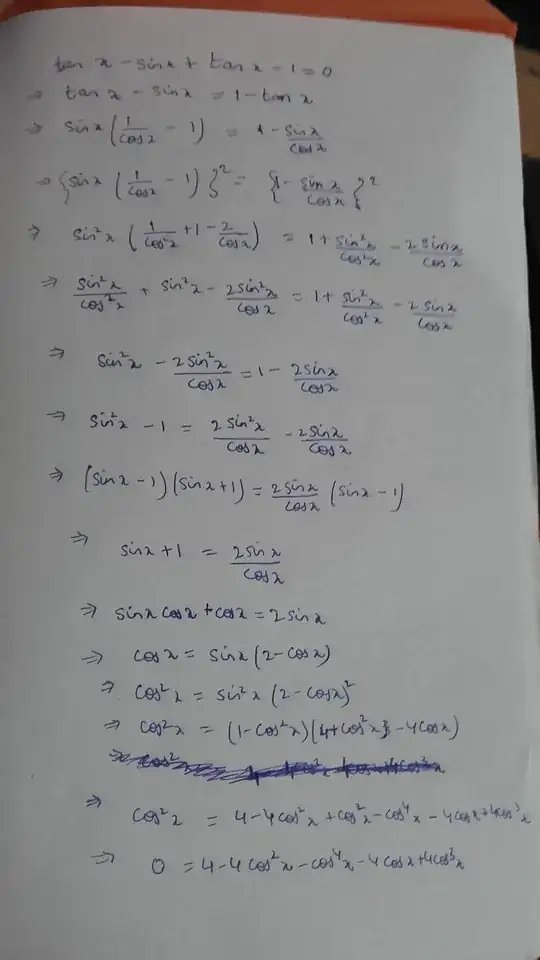The best progress I could make was to arrive at a degree 4 polynomial in $\cos x$:
$-\cos^4 x-4\cos^2x+4\cos^3x-4\cos x+4=0$. But I couldn't factor it out so that I can find the value of $\cos x$ and thus $x$.
Can anyone please help me to factor the polynomial or suggest an alternate method to solve the problem
Asked
Active
Viewed 669 times
-1
Gayatri
- 875
-
6$\tan x$ appears twice? – CY Aries Jun 18 '17 at 17:03
-
4Please put the full question in the question, not the title. As of yet, you haven't told us what the problem is. – Simply Beautiful Art Jun 18 '17 at 17:04
-
I just typed it into Alpha and did not get a symbolic answer. That doesn't prove there isn't one, but it is indicative. – Ross Millikan Jun 18 '17 at 17:09
-
@RossMillikan Actually, I'm thinking it should be clear that this can be reduced to a quartic of either $\sin$ or $\cos$, and all quartics have closed forms... (doesn't mean its pretty, but they have one) – Simply Beautiful Art Jun 18 '17 at 17:10
-
However, the given quartic is wrong... hence why we recommend the showing of work. – Simply Beautiful Art Jun 18 '17 at 17:12
-
@SimplyBeautifulArt: true, and OP did, but seemed to be looking for a simpler approach. – Ross Millikan Jun 18 '17 at 17:12
-
I have attatched my work, but as Ross Milikan said I am looking for a simpler approach. – Gayatri Jun 18 '17 at 17:28
2 Answers
2
The given quartic is not equivalent to the problem in the title. One may note that
$$2\tan x-\sin x+1=0\\2\frac{\sin x}{\cos x}-\sin x+1=0\\2\frac{\sin x}{\cos x}=1-\sin x\\4\frac{\sin^2x}{\cos^2x}=1-2\sin x+\sin^2x$$
Now use the Pythagorean identity to see that
$$4\frac{\sin^2x}{1-\sin^2x}=1-2\sin x+\sin^2x$$
Or,
$$4\sin^2x=1-2\sin x+2\sin^3x-\sin^4x$$
$$t=\sin x\implies0=t^4-2t^3+4t^2+2t-1$$
Now there are several approaches to factoring quartics. I won't go through the details, but you can read up on them here.
More or less, I recommend applying WolframAlpha, then extract desired solutions.
Simply Beautiful Art
- 74,685
0
use $$\sin(x)=\frac{2t}{1+t^2}$$ $$\tan(x)=\frac{2t}{1-t^2}$$ and $$\tan\left(\frac{x}{2}\right)=t$$
Dr. Sonnhard Graubner
- 95,283